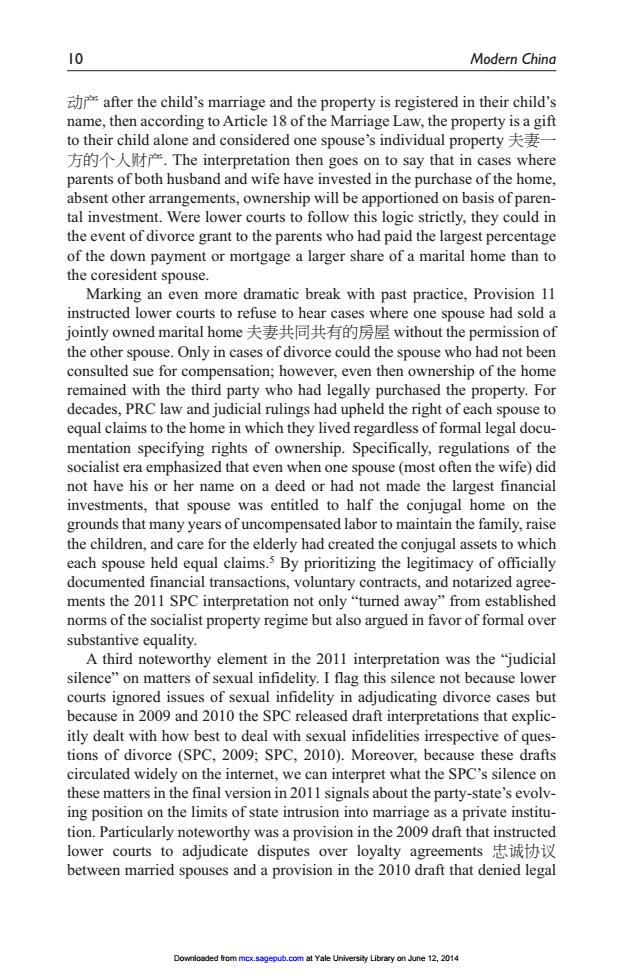正在加载图片...

10 Modern China after the child's marriage and the property is registered in their child's name,then according to Article 18 of the Marriage Law,the property is a gift to their child alone and considered one spouse's individual property 方的个人财产.The interpretation then goes on to say that in cases where parents of both husband and wife have invested in the purchase of the home, absent other arrangements,ownership will be apportioned on basis of paren- tal investment.Were lower courts to follow this logic strictly,they could in the event of divorce grant to the parents who had paid the largest percentage of the down payment or mortgage a larger share of a marital home than to the coresident spouse. Marking an even more dramatic break with past practice,Provision 11 instructed lower courts to refuse to hear cases where one spouse had sold a jointly owned marital home夫妻共同共有的房屋without the permission of the other spouse.Only in cases of divorce could the spouse who had not been consulted sue for compensation;however,even then ownership of the home remained with the third party who had legally purchased the property.For decades,PRC law and judicial rulings had upheld the right of each spouse to equal claims to the home in which they lived regardless of formal legal docu- mentation specifying rights of ownership.Specifically,regulations of the socialist era emphasized that even when one spouse(most often the wife)did not have his or her name on a deed or had not made the largest financial investments,that spouse was entitled to half the conjugal home on the grounds that many years of uncompensated labor to maintain the family,raise the children,and care for the elderly had created the conjugal assets to which each spouse held equal claims.>By prioritizing the legitimacy of officially documented financial transactions,voluntary contracts,and notarized agree- ments the 2011 SPC interpretation not only"turned away"from established norms of the socialist property regime but also argued in favor of formal over substantive equality. A third noteworthy element in the 2011 interpretation was the "judicial silence"on matters of sexual infidelity.I flag this silence not because lower courts ignored issues of sexual infidelity in adjudicating divorce cases but because in 2009 and 2010 the SPC released draft interpretations that explic- itly dealt with how best to deal with sexual infidelities irrespective of ques- tions of divorce (SPC,2009;SPC,2010).Moreover,because these drafts circulated widely on the internet,we can interpret what the SPC's silence on these matters in the final version in 2011 signals about the party-state's evolv- ing position on the limits of state intrusion into marriage as a private institu- tion.Particularly noteworthy was a provision in the 2009 draft that instructed lower courts to adjudicate disputes over loyalty agreements忠诚协议 between married spouses and a provision in the 2010 draft that denied legal Downloaded from mcx.sagepub.com at Yale University Library on June 12,201410 Modern China 动产 after the child’s marriage and the property is registered in their child’s name, then according to Article 18 of the Marriage Law, the property is a gift to their child alone and considered one spouse’s individual property 夫妻一 方的个人财产. The interpretation then goes on to say that in cases where parents of both husband and wife have invested in the purchase of the home, absent other arrangements, ownership will be apportioned on basis of parental investment. Were lower courts to follow this logic strictly, they could in the event of divorce grant to the parents who had paid the largest percentage of the down payment or mortgage a larger share of a marital home than to the coresident spouse. Marking an even more dramatic break with past practice, Provision 11 instructed lower courts to refuse to hear cases where one spouse had sold a jointly owned marital home 夫妻共同共有的房屋 without the permission of the other spouse. Only in cases of divorce could the spouse who had not been consulted sue for compensation; however, even then ownership of the home remained with the third party who had legally purchased the property. For decades, PRC law and judicial rulings had upheld the right of each spouse to equal claims to the home in which they lived regardless of formal legal documentation specifying rights of ownership. Specifically, regulations of the socialist era emphasized that even when one spouse (most often the wife) did not have his or her name on a deed or had not made the largest financial investments, that spouse was entitled to half the conjugal home on the grounds that many years of uncompensated labor to maintain the family, raise the children, and care for the elderly had created the conjugal assets to which each spouse held equal claims.5 By prioritizing the legitimacy of officially documented financial transactions, voluntary contracts, and notarized agreements the 2011 SPC interpretation not only “turned away” from established norms of the socialist property regime but also argued in favor of formal over substantive equality. A third noteworthy element in the 2011 interpretation was the “judicial silence” on matters of sexual infidelity. I flag this silence not because lower courts ignored issues of sexual infidelity in adjudicating divorce cases but because in 2009 and 2010 the SPC released draft interpretations that explicitly dealt with how best to deal with sexual infidelities irrespective of questions of divorce (SPC, 2009; SPC, 2010). Moreover, because these drafts circulated widely on the internet, we can interpret what the SPC’s silence on these matters in the final version in 2011 signals about the party-state’s evolving position on the limits of state intrusion into marriage as a private institution. Particularly noteworthy was a provision in the 2009 draft that instructed lower courts to adjudicate disputes over loyalty agreements 忠诚协议 between married spouses and a provision in the 2010 draft that denied legal Downloaded from mcx.sagepub.com at Yale University Library on June 12, 2014